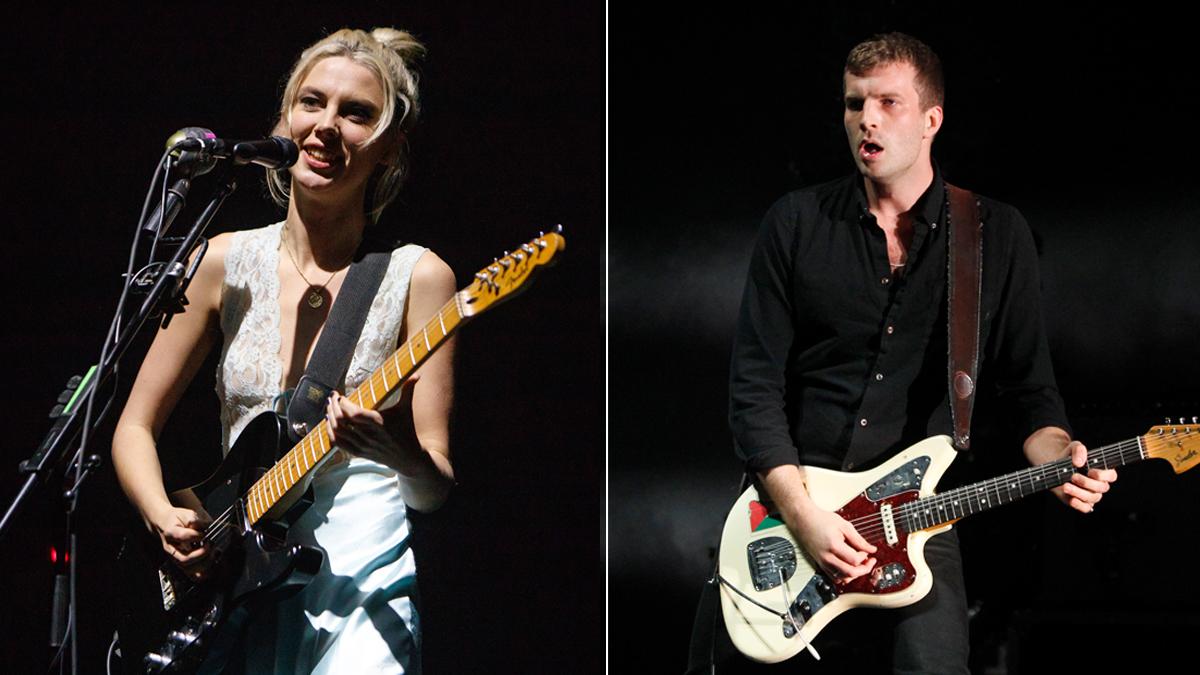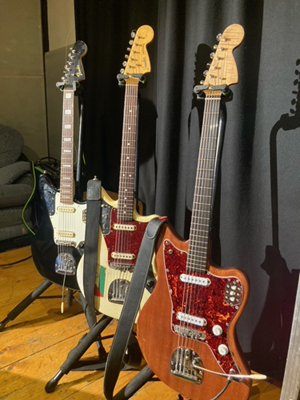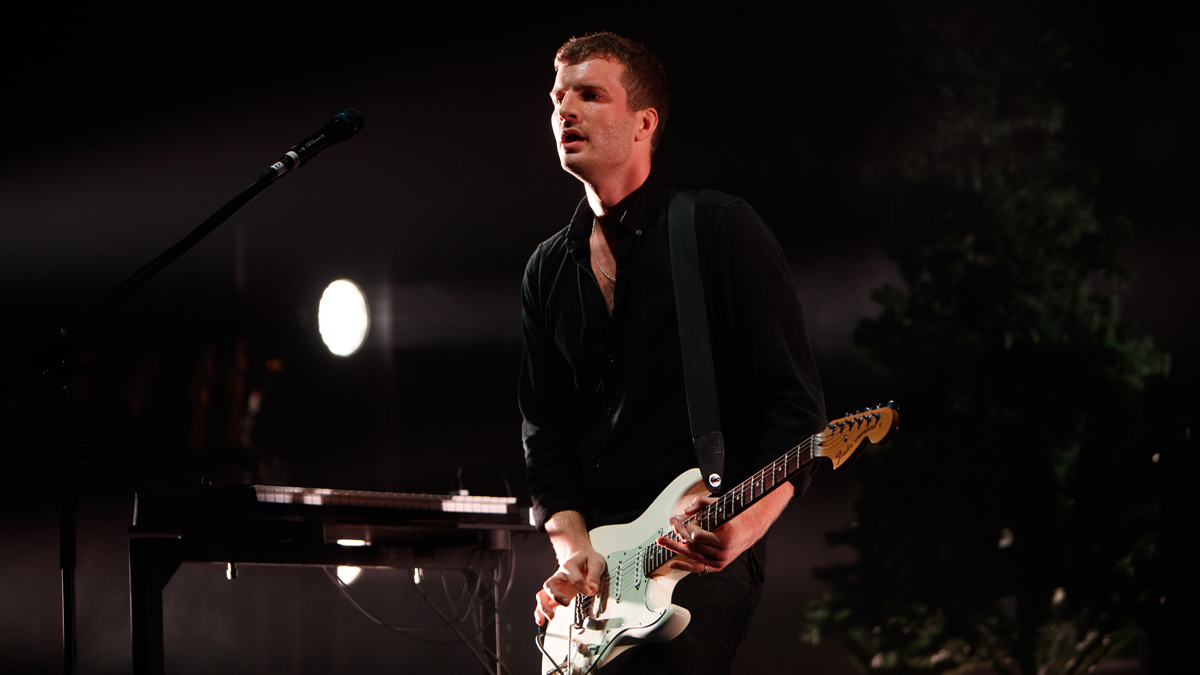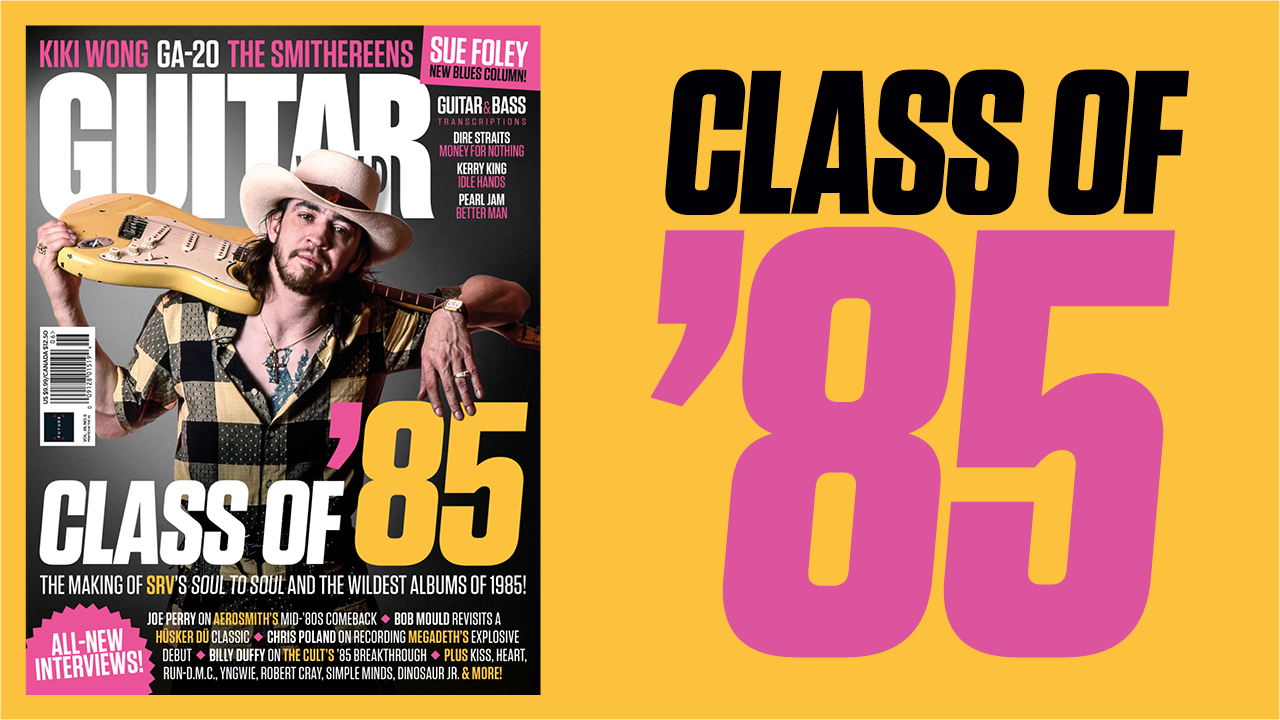Wolf Alice: "A lot of times, it's the ideas you feel more embarrassed to try that are your best ones”
Ellie Rowsell and Joff Oddie discuss how their evolving playing, the pandemic and a gigantic skull pedal made Wolf Alice's upcoming record, Blue Weekend

It’s crazy to think that just 10 years ago, the pair of players at the heart of one of the UK’s biggest rock bands had barely touched an electric guitar. Formed in 2010 by Ellie Rowsell and Joff Oddie, Wolf Alice was initially an acoustic duo, combining Ellie’s songwriting chops and Joff’s fingerstyle acoustic prowess.
At that point, London was in full sway to Mumford & Sons’ fairy-lit folk revivalism and, in retrospect, crying out for a band willing to drop the pastoral pastiches for something harder, heavier and, frankly, more fun. The group’s grunge-y conversion, with the addition of Joel Amey and Theo Ellis’s powerhouse rhythm section, was just the ticket, and their debut album My Love Is Cool hit number two on the UK charts.
2017 follow-up Visions Of A Life retained the barbed edge but showed growth, mulling over big themes of life and youthful confusion, amid some monstrous riffs. It met near-universal acclaim from critics, and netted them the UK’s prestigious Mercury prize in the process.
You’d forgive the band, then, if they’d lost their way for their third album, particularly given it was recorded amid the initial 2020 European lockdown, shut away in a residential studio in Belgium. A recipe for cabin fever and meltdown, if ever there was one.
Somehow, though, they’ve come back with a record that is quieter, yet more self-assured – Wolf Alice have still got teeth, but Blue Weekend manages to serve up bombast and beauty in equal measure.
We spoke to Joff and Ellie about their experiences recording amid the pandemic in Belgium, their journey as guitarists across the last 10 years and the instruments that have kept them company throughout that time.
You entered a residential studio to record this album right as the pandemic and lockdowns hit. What was the mood like in the band at that time?
Get The Pick Newsletter
All the latest guitar news, interviews, lessons, reviews, deals and more, direct to your inbox!
Ellie: "I think we were all really grateful to be locked down in the studio as a band. We were so lucky, but normally, if you do make an album somewhere isolated, you don't have this air of anxiety because the world is changing drastically around you, so there was a little bit of anxiety.
"Having zero distractions – you were not even allowed to leave the house for longer than half an hour – made it quite intense. But, you know, it was just a blessing to have this project to focus on. So the positives outweighed the negatives for us."
Let's talk about the playing on the record. The time you had in the studio allowed you to get a little more forensic around your parts. Producer Markus Dravs was reportedly quite pointed in asking questions of various parts. How so? And how did you manage that relationship?
Joff: "I think Markus is a 'less is more' kind of producer in some ways, in terms of, 'You get these sounds and that's that.' I think we are very much, 'More is more!' We're happiest when we're literally just throwing ideas out and going, 'What about this?'
We're very much, 'More is more!' We're happiest when we're literally just throwing ideas out and going, 'What about this?'
Joff Oddie
"So I think a bit of the dynamic was us wanting to do that, and him going, 'You lot need to calm the fuck down because you're just making some weird swirly noise out of a synthesizer and an amp, and I want to get home to my wife.' It was about finding a middle ground between those two places.
“When you work with a producer, they have to work with four people who have spent 10 years together, and who know each other inside out. So it takes a little while to get the dynamic to a sweet spot, and when we did it was brilliant… When he got tired of asking us questions. 'Do we have to do this?' 'Yes.' [laughs]"

You've spoken around this release about the importance of capturing soul in the recording on this record, which is something that guitarists talk about ad nauseam. What helps when that’s not working?
Ellie: "I think there's a number of things that we do. We always say that we work better when it's late, when it's darker. That often helps us get into a better zone. I don't know if that's a bit clichéd but it does seem to be true. Also, some of us will say, 'Will you play with me?' when we're tracking things on top. It just helps it to feel a bit more live and it takes the pressure off.
“Then, sometimes, you just need to move on and come back to it. A lot of times on this record we would do what we set out to do and then be like, 'Can I just try a few things now?' [At that point] there would be no pressure and you'd often get something a bit more soulful.
"A lot of times, it's the ideas that you feel a bit more embarrassed to try that are your best ones. Those things you try when it's the end of the day and you just get to throw a couple of things around. It's much more playful."
A lot of times, it's the ideas that you feel a bit more embarrassed to try that are your best ones. Those things you try when it's the end of the day
Ellie Rowsell
You two are the band’s founding members. What have you observed about each other's growth as guitarists across the time you've been playing together?
Joff: "The thing that has always annoyed me about Ellie is that she can write more memorable lines than I can, usually with two notes played less times, than I can playing lots of notes, all the time.
"When we met, Ellie could work her way around a chord progression pretty well, but for a long time, she didn't really play the guitar at gigs, except for some of the very early open mics. But you're kick-ass, mate, now!"
Ellie: "Ha! I actually feel like I'm not. I don't feel like I've got any better! I can only play our songs. I think, with Joff, what's really nice to see is that when we're not onstage or writing Wolf Alice stuff, you're always doing your more noodling folk-y guitar, slide playing and stuff like that. Now you've figured out a way to do it in our songwriting in a way that fits us as a pop or rock band.
"You've blended the stuff that we've always done – the heavy guitar, the wishy-washy shoegaze stuff – and now you're bringing in some of the acoustic-y, noodle-y stuff and the slide. It's the stuff that we know Joff is as a guitarist, but not everyone else sees and now it's been married into Wolf Alice."
What was the key to bringing that acoustic playing into Wolf Alice, then?
Joff: "There are a bunch of songs on the record that use a lot more acoustic instrumentation, but in a different way. There's quite a few songs, like the solo on The Beach II, and it also appears on Lipstick On The Glass, and maybe another one where we started doing this thing where we would layer up simple melodies with maybe four or five different acoustic instruments, to create these kind of music box sounds.
"We called it 'the folk ensemble', and it would be like tenor resonator guitars, acoustic guitars, 12-strings, banjos. There was this weird resonator Telecaster thing in the studio, so we were playing that acoustically.
We would layer up acoustic instruments to create these music box sounds. It would be like tenor resonators, acoustics, 12-strings, banjos. The studio had a lot of really odd instruments
Joff Oddie
“The studio had a lot of really odd instruments. We used a lot of those acoustic-y things. Obviously, Safe From Heartbreak, you can hear that very directly – that's a normal guitar and a Nashville-strung guitar playing in counterpoint.
"Then there's classical guitar on Lipstick On The Glass, so I had plenty of opportunities to bring in some of that acoustic stuff, alongside the heavier sounds and the more ethereal, textural stuff as well. At which point, Markus was tearing all of his hair out…”

What are your favorite guitar moments on the record?
Ellie: "Mine is definitely the slide on the end of Delicious Things. I love that. It's so simple, but the note Joff is playing... I would never have thought to do that. It's really good.
"I love slide guitar and yet it doesn't sound like pastiche or anything like that. I would never have thought to put it in there, but it works. I also love the weird off-rhythm solo thing that you put in at the end of Play The Greatest Hits."
Joff: "Oh yeah! That was that tenor resonator guitar. It was an odd one. I think we were recording something else at the time and that was just in between takes, noodling around. I think, for me, the most impactful guitar part was probably in the end chorus of How Do I Make It OK?
"A riff returns, which is in the beginning of the song. That's a piece that Ellie wrote and it's just incredible. For some reason, the whole song just seems to go widescreen at that point, because of that change in the guitar and bass, and I think it's really interesting and clever."
What was the fuzz tone on Smile? You can't miss that one.
Joff: "Errrrrr. I think there were a couple of different things on it. I think there were Big Muffs on it, doing that nice trick of the stereo fuzz where you hard pan that, and then you've got something that destroys all the cymbals, which is great. I think it was this weird skull pedal. I've no idea what it was called, but it was like a big 6"x4" skull..
Ellie: "Oh my god, with the moving eyes!"
Joff: "Yeah! And then you changed the tone and volume with them. I have no idea what that pedal is. [further research confirms it is the Dr. No Skull Fuzz, which has moving eyeballs for controlling volume and tone]. It was bizarre."
As you mentioned, ICP has a pretty cavernous store of equipment. What were your go-to guitars and amps for the sessions?
Now we've done it a bunch of times, we know what works. That gives you more time to experiment with the new things
Joff Oddie
Joff: "In terms of guitars, it was mostly ours. If it was an electric sound, it was those, really. A lot of the Jaguar [for me] and Telecaster [for Ellie].
"To be honest, most of the guitar sounds were done through a '70s master volume [Fender] Twin. I think sometimes you can get carried away with all the gear in a place like that.
"Now we've done it a bunch of times, we know what works and it feels like, if you know what you want to get – if that's a stereo fuzz thing, or a clean guitar sound – I will know there will be certain go-tos, and that something like a Twin and my Jaguar would do that absolutely fine. That gives you more time to experiment with the new things."

What are your normal, go-to guitars?
Joff: "The one that Ellie uses is a Korean-made Telecaster. It was a gift for my 15th or 16th birthday, so that would have been 2004/5 or something. Then my Jaguar is a '62 reissue that I bought secondhand off a bloke in Wood Green [in London], probably nine or 10 years ago. I think those models came out early 2000s, so they're probably about the same age. They're not mad vintage numbers."
It’s great that you're still using those instruments, though. That a Korean Tele has done those gigs, that scale of show, no problem.
Joff: "The Korean Tele is fantastic. You know, if it ain't broke... I’ve also been playing a Jaguar that I built myself. I’d had this big block of mahogany under my bed and always sort of said, 'One day...'
I've been playing a Jaguar I built myself. I was so surprised it worked! It's been the guitar I've been playing for the last three months
Joff Oddie
"Then, in the last couple of days in the studio, I was trying to figure out what the fuck I was going to do after, because I'm not very good when I have time on my hands, so I bought a hand-router and a couple of chisels, and it took about 10 months all-in-all.
"I started with the body and felt like, 'It works!' Then went, 'I'll try and make a neck.' So I bought a couple of blanks, a piece of flame-y maple and a piece of rosewood, and had a go at it. I was just so surprised it worked! It's been the guitar I've been playing for the last three months, which is kind of crazy. I played it on Jools Holland, on BBC Radio One the other day."

How would you describe the sound of it?
Joff: "It's a Jaguar, without the rhythm control at the top. That's just been replaced with a kill switch. It's otherwise the same electronics that I've got in my other Jaguars.
"I didn't want the tones to be too dissimilar as I was going to be changing between guitars [on the road], so they're Lollar pickups and then it's standard hardware, apart from a Mastery bridge. It's also a Gibson scale length, as I’ve got quite large hands and now I can play chords past the 12th fret, so I'm very pleased with it!"
You've discussed previously that, as a songwriter, your goal should really be to write the song that would play at your funeral. At the risk of being morbid, how close do you think you've got to that?
Ellie: "Err, I don't know! I feel like that is not for me to say. I don't feel like I can say a song is good enough for that, but we have been playing acoustic versions of a lot of the songs on this album.
"So, perhaps rather than playing them at your funeral, you can do the 'campfire test', to see whether they hold up on their own if you sing them and play them with an acoustic guitar or piano. I do think a lot of the songs work like that this time around, so I feel very happy about that."
- Blue Weekend is out on June 4 via Dirty Hit/RCA Records.

Matt is Deputy Editor for GuitarWorld.com. Before that he spent 10 years as a freelance music journalist, interviewing artists for the likes of Total Guitar, Guitarist, Guitar World, MusicRadar, NME.com, DJ Mag and Electronic Sound. In 2020, he launched CreativeMoney.co.uk, which aims to share the ideas that make creative lifestyles more sustainable. He plays guitar, but should not be allowed near your delay pedals.
“The main acoustic is a $100 Fender – the strings were super-old and dusty. We hate new strings!” Meet Great Grandpa, the unpredictable indie rockers making epic anthems with cheap acoustics – and recording guitars like a Queens of the Stone Age drummer
“You can almost hear the music in your head when looking at these photos”: How legendary photographer Jim Marshall captured the essence of the Grateful Dead and documented the rise of the ultimate jam band




![John Mayer and Bob Weir [left] of Dead & Company photographed against a grey background. Mayer wears a blue overshirt and has his signature Silver Sky on his shoulder. Weir wears grey and a bolo tie.](https://cdn.mos.cms.futurecdn.net/C6niSAybzVCHoYcpJ8ZZgE.jpg)

![A black-and-white action shot of Sergeant Thunderhoof perform live: [from left] Mark Sayer, Dan Flitcroft, Jim Camp and Josh Gallop](https://cdn.mos.cms.futurecdn.net/am3UhJbsxAE239XRRZ8zC8.jpg)






